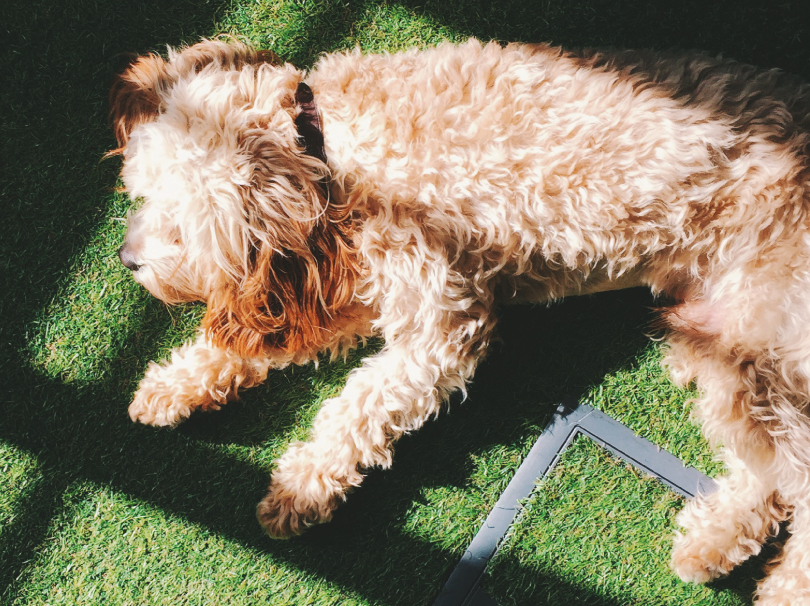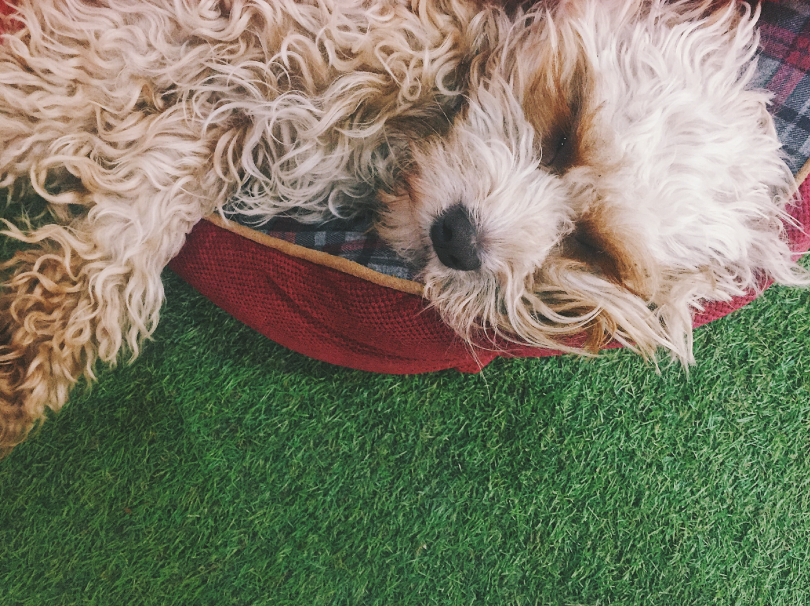If there’s one thing we envy about our dogs, it’s that they never have to feel guilty about hitting the snooze button a few too many times. Some dogs are super active each day, while others prefer to be curled up and chilled out. But how much sleep does your dog actually need?
Why is sleep so important?
Just as it is for humans, sleep is needed to allow the body to recover from daily activities. For puppies, sleep is important to allow healthy mental growth and development, as well as physical. Puppies require a lot more sleep and will tend to nap more often than adult dogs as a result.

How much sleep does a dog need?
Every dog is different and some will sleep more than others. As a general rule, dogs tend to sleep for about half of their time throughout a 24 hour day. In some cases, sleeping for 12-14 hours a day isn’t unusual. Some dogs will spend a lot of their time resting, but not actively sleeping. Due to the amount of time dogs spend sleeping, napping or resting, it’s important to make sure they’ve got a comfortable and secure environment to rest their head.
What about puppies?
During their first year, a puppy’s body undergoes an enormous change, with some dogs growing to their adult size in the space of a year. In this period, they’ll need quality nutrition and sleep to digest and utilise the food for their optimum growth.
It’s not unusual for puppies to sleep for 18 hours or more each during a 24 hour day. This is often accompanied by short bursts of excitable and sudden strenuous activity throughout the day! And then they’ll nod off again.
The exact amount of sleep a puppy needs changes as they grow. When you first bring them home they need more sleep, as they’re growing and developing more, just like a human baby. An 8 week old puppy can sleep as much as 18-20 hours a day, but by the time they’re 4 months old they could be down to 14-16 hours.
Reading your dog’s sleeping pattern
Knowing your dog’s sleeping pattern can help you determine any change or development in physical or emotional health issues. Sleeping more than usual signals changes in health in the same way that being more lethargic or less energetic does.
Dogs who are unwell/suffering from pain or illness will often withdraw from interacting with the family and head to their beds to sleep. If you notice any changes in your dog that have you worried, give your vet a call.
What can oversleeping be a symptom of?
Unlike humans, dogs are the masters of disguise when it comes to showing pain. An increase in sleep can be a sign your dog is dealing with a chronic low-grade pain, like arthritis. Symptoms of soreness can be missed if dogs aren’t displaying visible or audible symptoms like crying or limping.
Find out more about spotting pain in your dog.
Oversleeping can also indicate your dog is overweight or even obese, as the extra exertion required to get around can be exhausting. Hormonal problems such as underactive thyroid glands can also lead to sluggishness and increased sleep. A combination of knowing your dog’s sleeping habits, feeding them a nutritionally balanced diet and keeping them fit and active will help keep them healthy and in good shape.
If you’re worried they’re suddenly sleeping more or are withdrawing themselves to bed for longer periods of time, take your dog to the vet for a checkup.


My dog sleeps about 18 hours a day. He often sleeps from 8 am until around 5 pm and then again from 10 pm until around 7 am. On the days that we have got family trips/dogpark/exercise/long walks, he sleeps for 2 days straight.
Is he normal or not?
My dog sleeps about 18 hours a day. He often sleeps from 8 am until around 5 pm and then again from 10 pm until around 7 am. On the days that we have got family trips/dogpark/exercise/long walks, he sleeps for 2 days straight.
Is he normal or not?
Just like human beings, I know that oversleeping is not good for doggies as well. But, I love seeing my puppies to sleep. They look so cute that I keep trying to wake them up, though it fails. Maybe they are just like infants, who need a long sleep during their growth period.